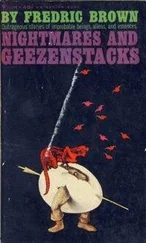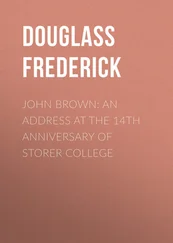Fredrick Brown - Night of the Jabberwock
Здесь есть возможность читать онлайн «Fredrick Brown - Night of the Jabberwock» весь текст электронной книги совершенно бесплатно (целиком полную версию без сокращений). В некоторых случаях можно слушать аудио, скачать через торрент в формате fb2 и присутствует краткое содержание. Жанр: Фэнтези, на английском языке. Описание произведения, (предисловие) а так же отзывы посетителей доступны на портале библиотеки ЛибКат.
- Название:Night of the Jabberwock
- Автор:
- Жанр:
- Год:неизвестен
- ISBN:нет данных
- Рейтинг книги:4 / 5. Голосов: 1
-
Избранное:Добавить в избранное
- Отзывы:
-
Ваша оценка:
- 80
- 1
- 2
- 3
- 4
- 5
Night of the Jabberwock: краткое содержание, описание и аннотация
Предлагаем к чтению аннотацию, описание, краткое содержание или предисловие (зависит от того, что написал сам автор книги «Night of the Jabberwock»). Если вы не нашли необходимую информацию о книге — напишите в комментариях, мы постараемся отыскать её.
Night of the Jabberwock — читать онлайн бесплатно полную книгу (весь текст) целиком
Ниже представлен текст книги, разбитый по страницам. Система сохранения места последней прочитанной страницы, позволяет с удобством читать онлайн бесплатно книгу «Night of the Jabberwock», без необходимости каждый раз заново искать на чём Вы остановились. Поставьте закладку, и сможете в любой момент перейти на страницу, на которой закончили чтение.
Интервал:
Закладка:
It might have been a mystery, but it wasn't.
Mrs. Carr was there, putting on her hat in front of the panel mirror in the closet door as I went in.
She said, "I'm just leaving, Mr. Stoeger. I wasn't able to get here this afternoon, so I came to clean up this evening instead; I just finished."
"Fine," I said. "By the way, there's a blizzard out."
"A — what?"
"Blizzard. Snowstorm." I held up the wrapped bottle. "So maybe you'd better have a little nip with me before you start home, don't you think?"
She laughed. "Thanks, Mr. Stoeger. I will. I've had a pretty rough day, and it sounds like a good idea. I'll get glasses for us."
I put my hat in the closet and followed her out into the kitchen.
"A rough day?" I asked her. "I hope nothing went wrong."
"Well — nothing too serious. My husband — he works, you know, out at Bonney's fireworks factory — got burned in a little accident they had out there this afternoon, and they brought him home. It's nothing serious, a second degree burn the doctor said, but it was pretty painful and I thought I'd better stay with him until after supper, and then he finally got to sleep so I ran over here and I'm afraid I straightened up your place pretty fast and didn't do a very good job."
"Looks spotless to me," I said. I'd been opening the bottle while she'd been getting glasses for us. "I hope he'll be all right, Mrs. Carr. But if you want to skip coming here for a while—"
"Oh, no, I can still come. He'll be home only a few days, and it was just that today they brought him home at two o'clock, just when I was getting ready to come here and — That's plenty, thanks."
We touched glasses and I downed mine while she drank about half of hers. She said, "Oh, there was a phone call for you, about an hour ago. A little while after I got here."
"Find out who it was?"
"He wouldn't tell me, just said it wasn't important."
I shook my head sadly. "That, Mrs. Carr, is one of the major fallacies of the human mind. The idea, I mean, that things can be arbitrarily divided into the important and the unimportant. How can anyone decide whether a given fact is important or not unless one knows everything about it; and no one knows everything about anything."
She smiled, but a bit vaguely, and I decided to bring it down to earth. I said, "What would you say is important, Mrs. Carr?"
She put her head on one side and considered it seriously. "Well, work is important, isn't it?"
"It is not," I told her. "I'm afraid you score zero. Work is only a means to an end. We work in order to enable ourselves to do the important things, which are the things we want to do. Doing what we want to do — that's what's important, if anything is."
"That sounds like a funny way of putting it, but maybe you're right. Well, anyway, this man who called said he'd either call again or come around. I told him you probably wouldn't be home until eight or nine o'clock."
She finished her drink and declined an encore. I walked to the front door with her, saying that I'd have been glad to drive her home but that my car had two flat tires. I'd discovered them that morning when I'd started to drive to work. One I might have stopped to fix, but two discouraged me; I decided to leave the car in the garage until Saturday afternoon, when I'd have lots of time. And then, too, I know that I should get the exercise of walking to and from work every day, but as long as my car is in running condition, I don't. For Mrs. Carr's sake, though, I wished now that I'd fixed the tires.
She said, "It's only a few blocks, Mr. Stoeger. I wouldn't think of letting you, even if your car was working. Good night."
"Oh, just a minute, Mrs. Carr. What department at Bonney's does your husband work in?"
"The Roman candle department."
It made me forget, for the moment, what I'd been leading up to. I said, "The Roman candle department! That's a wonderful phrase; I love it. If I sell the paper, darned if I don't look up Bonney the very next day. I'd love to work in the Roman candle department. Your husband is a lucky man."
"You're joking, Mr. Stoeger. But are you really thinking of selling the paper?"
"Well — thinking of it." And that reminded me. "I didn't get any story on the accident at Bonney's, didn't even hear about it. And I'm badly in need of a story for the front page. Do you know the details of what happened? Anyone else hurt?"
She'd been part way across the front porch, but she turned and came back nearer the door. She said, "Oh, please don't put it in the paper. It wasn't anything important; my husband was the only one hurt and it was his own fault, he says. And Mr. Bonney wouldn't like it being in the paper; he has enough trouble now getting as many people as he needs for the rush season before the Fourth, and so many people are afraid to work around powder and explosives anyway. George will probably be fired if it gets written up in the paper and he needs the work."
I sighed; it had been an idea while it lasted. I assured her that I wouldn't print anything about it. And if George Carr had been the only one hurt and I didn't have any details, it wouldn't have made over a one-inch item anyway.
I would have loved, though, to get that beautiful phrase, "the Roman candle department," into print.
I went back inside and closed the door. I made myself comfortable by taking off my suit coat and loosening my tie, and then I got the whisky bottle and my glass and put them on the coffee table in front of the sofa.
I didn't take the tie off yet, nor my shoes; it's nicer to do those things one at a time as you gradually get more and more comfortable.
I picked out a few books and put them within easy reach,. poured myself a drink, sat down, and opened one of the books.
The doorbell rang.
Al Grainger had come early, I thought. I went to the door and opened it. There was a man standing there, just lifting his hand to ring again. But it wasn't Al; it was a man I'd never seen before.
CHAPTER THREE
How cheerfully he seems to grin,
How neatly spreads his claws,
And welcomes little fishes in
With gently smiling jaws!
He was short, about my own height, perhaps, but seeming even shorter because of his greater girth. The first thing you noticed about his face was his nose; it was long, thin, pointed, grotesquely at variance with his pudgy body. The light coming past me through the doorway reflected glowing points in his eyes, giving them a catlike gleam. Yet there was nothing sinister about him. A short pudgy man can never manage to seem sinister, no matter how the light strikes his eyes.
"You are Doctor Stoeger?" he asked.
"Doc Stoeger," I corrected him. "But not a doctor of medicine. If you're looking for a medical doctor, one lives four doors west of here."
He smiled, a nice smile. "I am aware that you are not a medico, Doctor. Ph. D., Burgoyne College — nineteen twenty-two, I believe. Author of Lewis Carroll Through the Looking-Glass and Red Queen and White Queen."
It startled me. Not so much that he knew my college and the year of my magna cum laude, but the rest of it was amazing. Lewis Carroll Through the Looking-Glass was a monograph of a dozen. pages; it had been printed eighteen years ago and only a hundred copies had been run off. If one still existed anywhere outside of my own library, I was greatly surprised. And Red Queen and White Queen was a magazine article that had appeared at least twelve years ago in a magazine that had been obscure then and had long since been discontinued and forgotten.
"Yes," I said. "But how you know of them, I can't imagine, Mr.—"
"Smith," he said gravely. Then he chuckled. "And the first name is Yehudi."
"No!" I said.
Читать дальшеИнтервал:
Закладка:
Похожие книги на «Night of the Jabberwock»
Представляем Вашему вниманию похожие книги на «Night of the Jabberwock» списком для выбора. Мы отобрали схожую по названию и смыслу литературу в надежде предоставить читателям больше вариантов отыскать новые, интересные, ещё непрочитанные произведения.
Обсуждение, отзывы о книге «Night of the Jabberwock» и просто собственные мнения читателей. Оставьте ваши комментарии, напишите, что Вы думаете о произведении, его смысле или главных героях. Укажите что конкретно понравилось, а что нет, и почему Вы так считаете.












